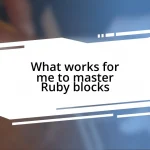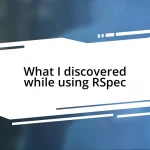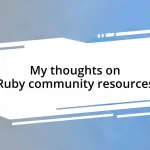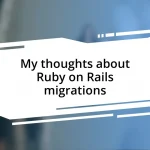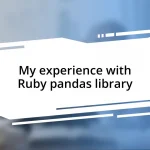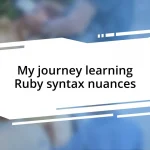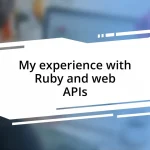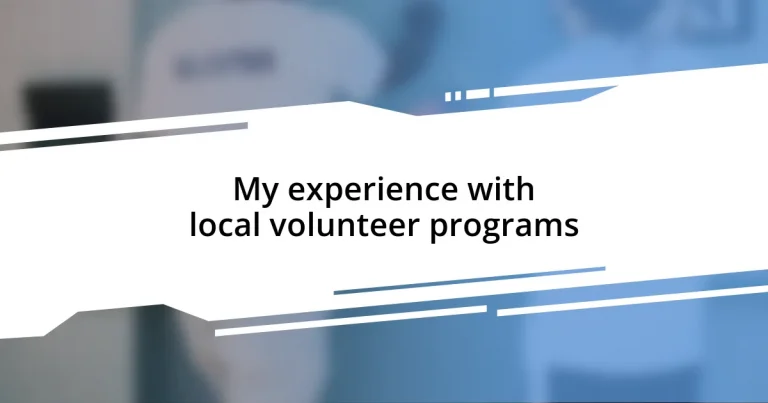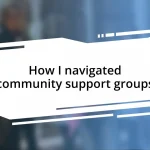Key takeaways:
- Local volunteer programs connect individuals to their communities, fostering personal growth and a sense of belonging.
- Volunteering cultivates skills, networking opportunities, and cultural understanding while boosting mental well-being.
- Effective communication with organizations enhances volunteer experiences and builds camaraderie among participants.
- Long-term community connections formed through volunteering create a supportive network, amplifying collective efforts and impact.
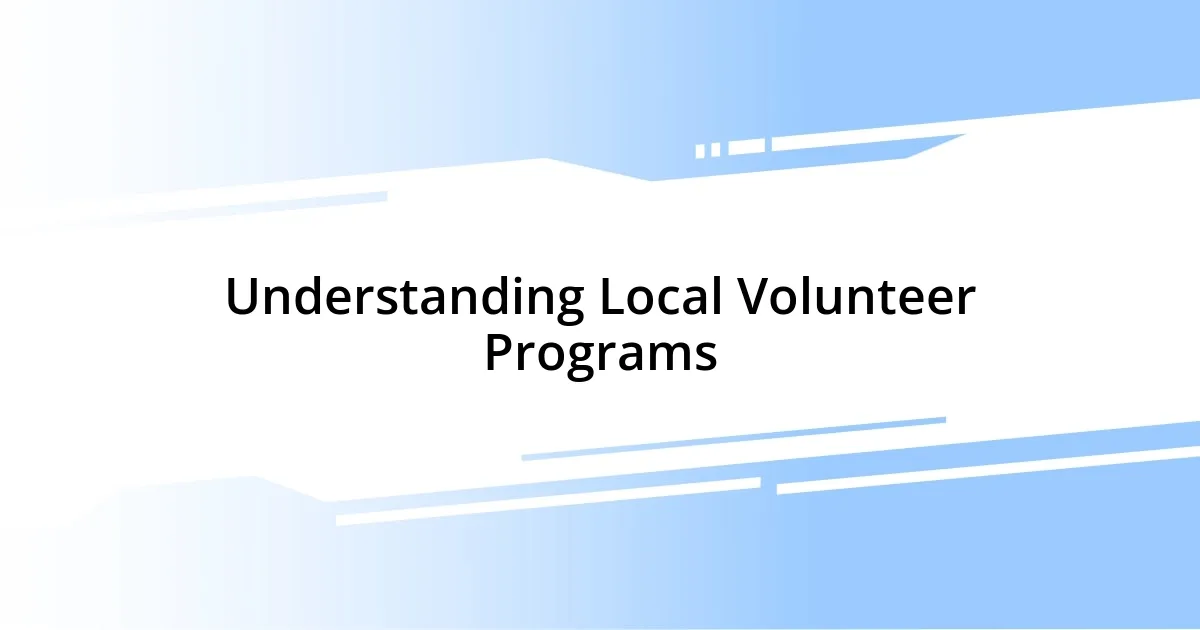
Understanding Local Volunteer Programs
Local volunteer programs serve as a bridge between individuals and their communities, providing a unique opportunity to contribute while gaining valuable experiences. I’ve often found myself pondering, what motivates someone to dedicate their time to help others? For me, it was the realization that every little effort counts; even a small act can spark a ripple effect of positivity and change.
These programs often focus on specific needs within the community, whether it’s helping the elderly, supporting local schools, or addressing environmental issues. I remember my first experience volunteering at a community garden. Initially, I was just following orders, but before long, I felt a deep connection to the land and the people around me. It made me think about how volunteering is not just about giving; it’s also about receiving lessons in gratitude and community spirit.
Engagement in local volunteer initiatives can be life-changing, both for the volunteers and the recipients. I still vividly recall the stories shared during those sessions—each one painted a fuller picture of our community’s needs. Have you ever considered how your unique skills could address local challenges? This kind of reflection can open doors to fulfilling experiences that not only enrich your life but also uplift those around you.
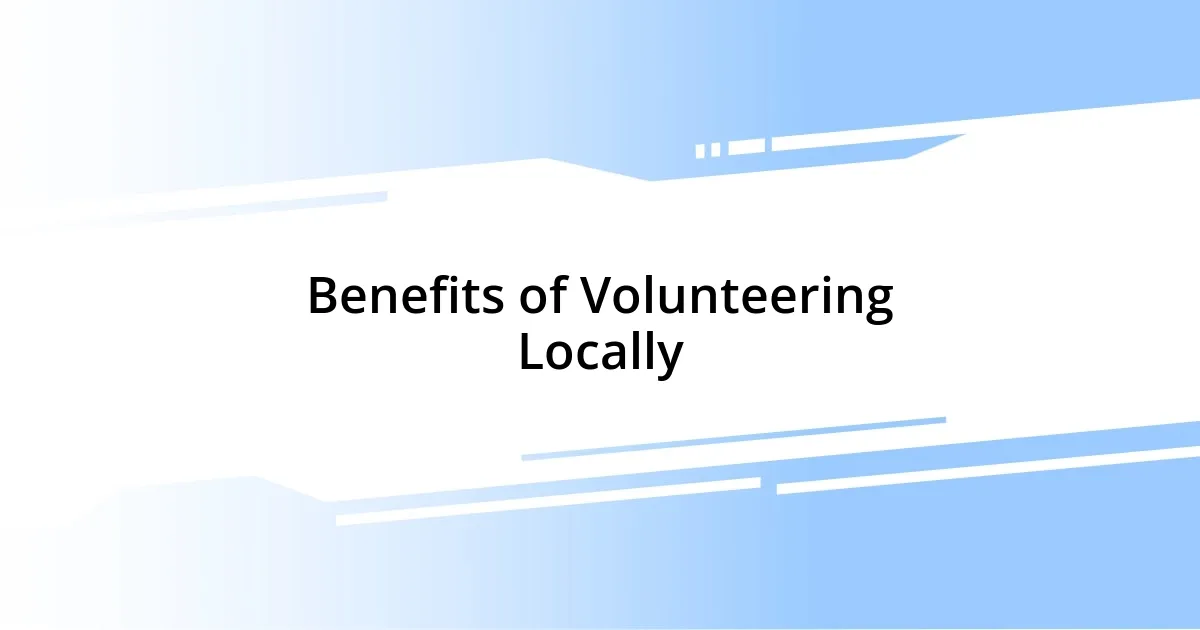
Benefits of Volunteering Locally
Volunteering locally offers a multitude of benefits that extend beyond just helping others. One of the most rewarding aspects I’ve discovered is the strong sense of community it fosters. When I volunteered at a local shelter, I was struck by how people from various backgrounds came together for a common cause. It was a reminder that, despite our differences, we can unite in making a tangible difference. This connection boosted my sense of belonging and helped me build lasting friendships.
Here are some key benefits of volunteering in your community:
- Skill Development: I learned new skills—like event planning and teamwork—that I didn’t expect to gain while volunteering.
- Networking Opportunities: Building relationships opened doors to job opportunities I hadn’t considered before.
- Increased Well-Being: I noticed a positive change in my mental health; giving back made me feel more fulfilled and grateful for what I have.
- Empowerment: Volunteering made me feel empowered. I realized my contributions, no matter how small, had a significant impact on someone’s life.
- Cultural Understanding: Engaging with diverse community members broadened my perspective, deepening my appreciation for different cultures and experiences.
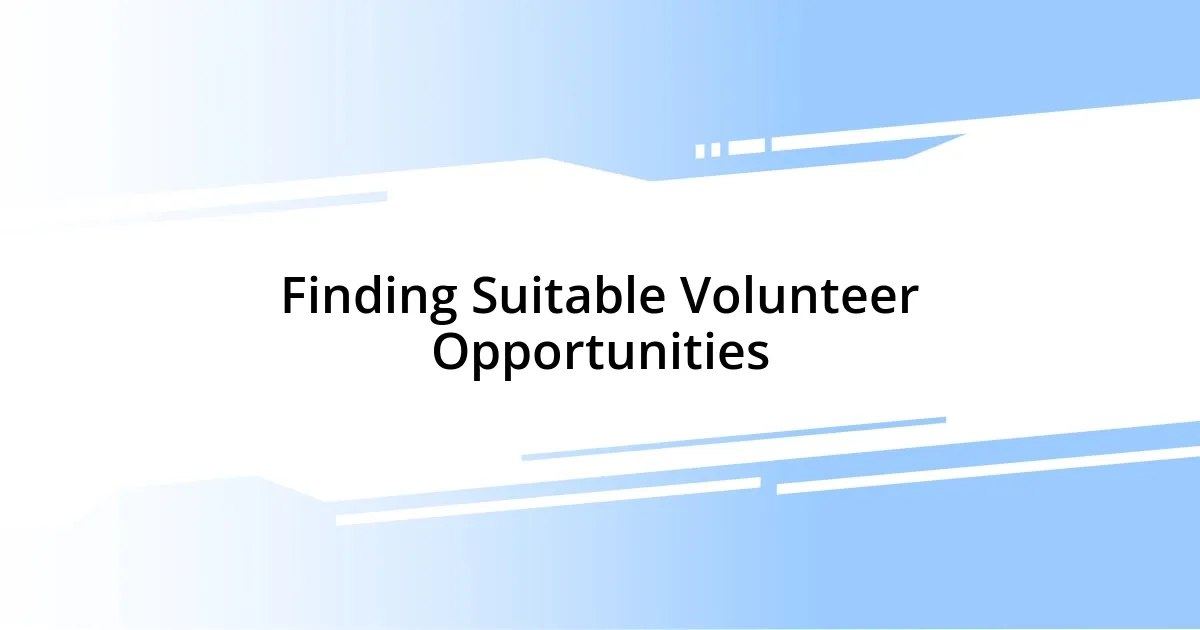
Finding Suitable Volunteer Opportunities
Finding the right volunteer opportunity can feel overwhelming. I remember when I first started searching; there were countless organizations and causes, each seeking help. To narrow it down, I reflected on my interests and skills. Did I want to work with children, the environment, or perhaps the elderly? This clarity made my search more focused and fulfilling.
I found that local community boards and online platforms were fantastic resources. It’s important to research and read reviews or testimonials from past volunteers. I came across a local literacy program and, after reading about their impact, knew that was the perfect fit for me. Understanding the mission and values of an organization is crucial. It ensures your efforts align with your passions, resulting in a more enriching experience.
Engagement in a cause you care about amplifies your motivation. The local food bank I volunteered with was more than just a job to me; it struck a personal chord. Having grown up with limited resources, being part of something that directly addressed food insecurity resonated with my own experiences. When you’re driven by personal connections to the cause, the work feels less like volunteering and more like a purpose.
| Criteria | Importance |
|---|---|
| Personal Interest | High |
| Skill Alignment | Moderate |
| Organization Mission | Critical |
| Location Convenience | Moderate |
| Impact Potential | High |
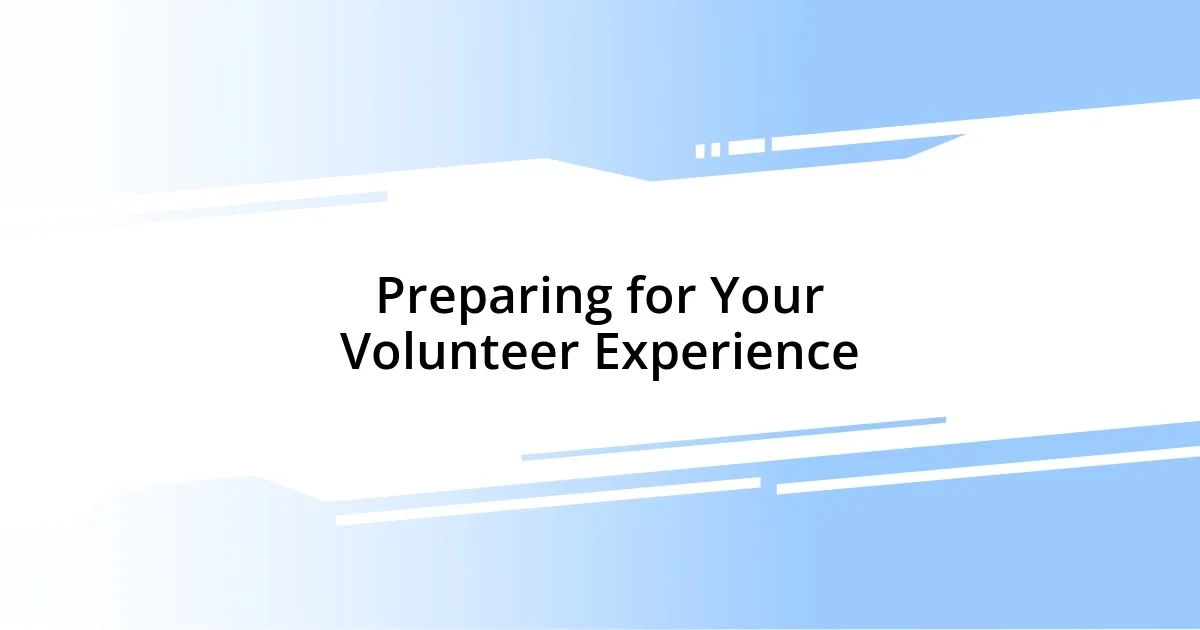
Preparing for Your Volunteer Experience
Preparing for your volunteer experience involves a blend of reflection and practical preparation. I vividly remember my first day volunteering at a local organization; I felt a mix of excitement and nervousness. To ease that anxiety, I made a checklist. It included packing comfortable clothes, vital personal items, and even reviewing the organization’s mission one last time. This way, I felt informed and ready to dive into the experience.
It’s also important to mentally prepare yourself for potential challenges. During my time at a community garden, unexpected weather changes created hurdles that required flexibility and a positive attitude. I found that being open to adapting my plan not only eased my stress but also led to some unforgettable team bonding moments. Have you ever realized how much your mindset can affect your experience?
Communication is key in volunteer settings—don’t hesitate to ask questions. In my experience, seeking clarity during orientations made me feel more engaged and equipped to contribute effectively. I once spoke up about a task that seemed unclear, and it led to a rewarding discussion on the project’s goals with fellow volunteers. This simple act of communication deepened my connection with the team and helped me understand the larger impact of our work. Preparing in this way enhances not just your experience but everyone’s around you.
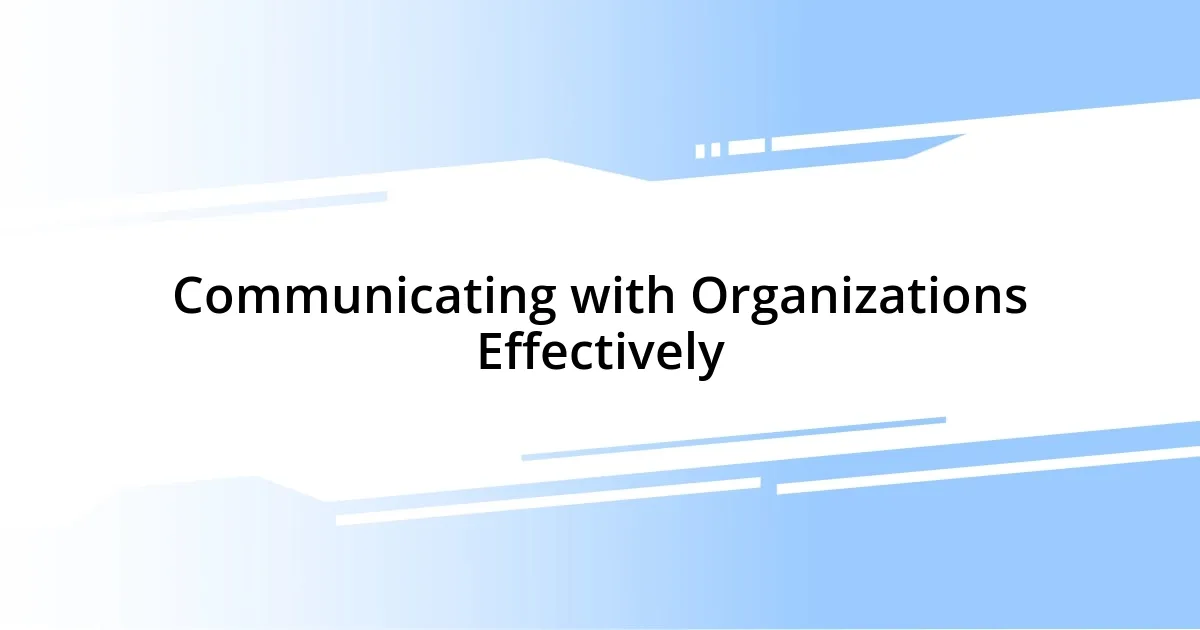
Communicating with Organizations Effectively
Effective communication with organizations is an essential skill that I’ve refined through my volunteer experiences. One thing I learned early on is that clarity matters. When I reached out to a local animal shelter, I made sure to inquire about their specific needs and expectations. This approach not only streamlined my contributions but also established a mutual understanding that made the volunteering relationship more productive. Have you ever felt unsure about what an organization needs? Having those conversations can clear up confusion immensely.
Building rapport with the staff and other volunteers is equally important. I recall my time at a community youth program where open communication helped create a supportive atmosphere. Simple things like sharing a meal or chatting during breaks fostered connections that went beyond our roles. This feeling of camaraderie encouraged us all to share ideas freely, enhancing our collective impact. So, how can you cultivate that rapport? Initiate conversations and be genuinely curious about others’ experiences; you’ll find it goes a long way.
Feedback is another critical component. In my experience volunteering for a community clean-up, I made it a point to provide my thoughts on the process after the event. Surprisingly, my suggestions were welcomed, sparking a discussion about ways we could improve future clean-ups. This exchange not only illustrated that my opinion mattered but also created a sense of ownership and investment in the cause. Have you ever been in a position where your input made a difference? I encourage you to share your insights—effective communication can empower change!
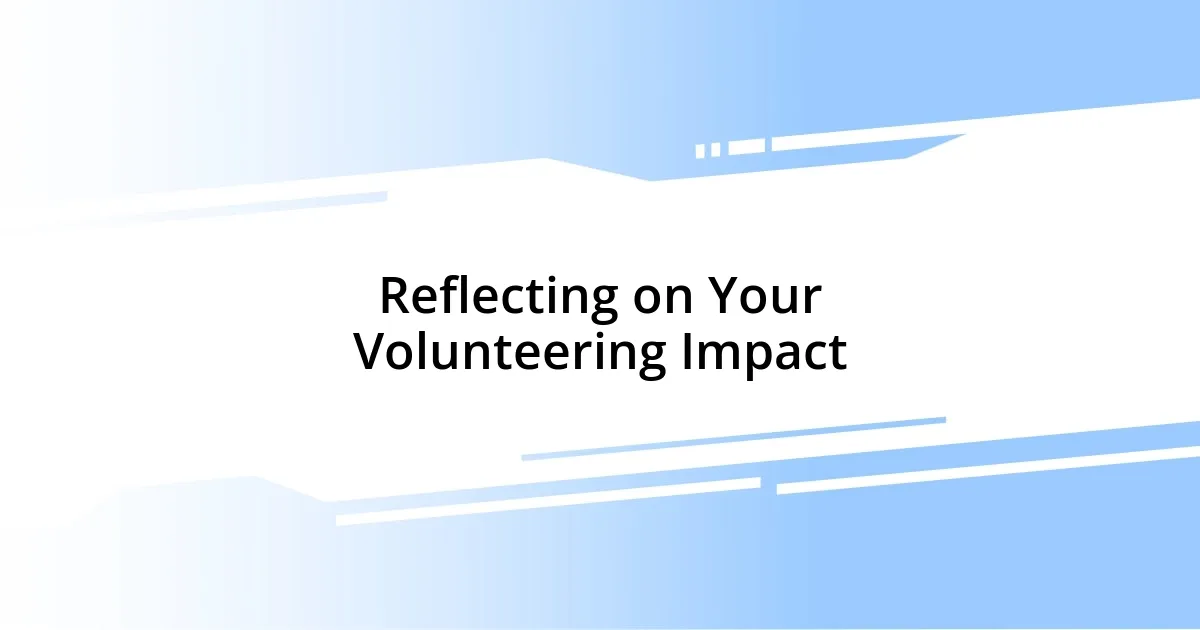
Reflecting on Your Volunteering Impact
Reflecting on the impact of my volunteering can be both humbling and enlightening. I vividly remember leaving a local food bank after a busy distribution day, my heart filled with gratitude and a sense of purpose. I had spent hours helping families in need, and it struck me how small acts—like being a friendly face or offering a smile—could create ripples of positivity. Have you ever paused to consider the emotional weight you carry from such experiences?
One particular moment stands out. I once volunteered to read with children at a local library, and their laughter and eagerness ignited a spark in me. While I may have gone there to teach, I left with lessons that reminded me how vital community engagement is. I felt a deeper connection to these kids, realizing that showing up was my way of investing in their futures. Isn’t it fascinating how volunteering can turn into a two-way street of growth?
As I reflect, I also think about the lasting connections made along the way. After collaborating with other volunteers on a park cleanup, we shared stories over pizza, forming bonds that extended beyond the event. Those conversations compelled me to reevaluate my role in the community and consider how collective efforts amplify our impact. Have you ever found that meaningful connections shift your perspective on volunteering? For me, it certainly has—a reminder that we are all in this together, and our combined efforts can lead to profound change.
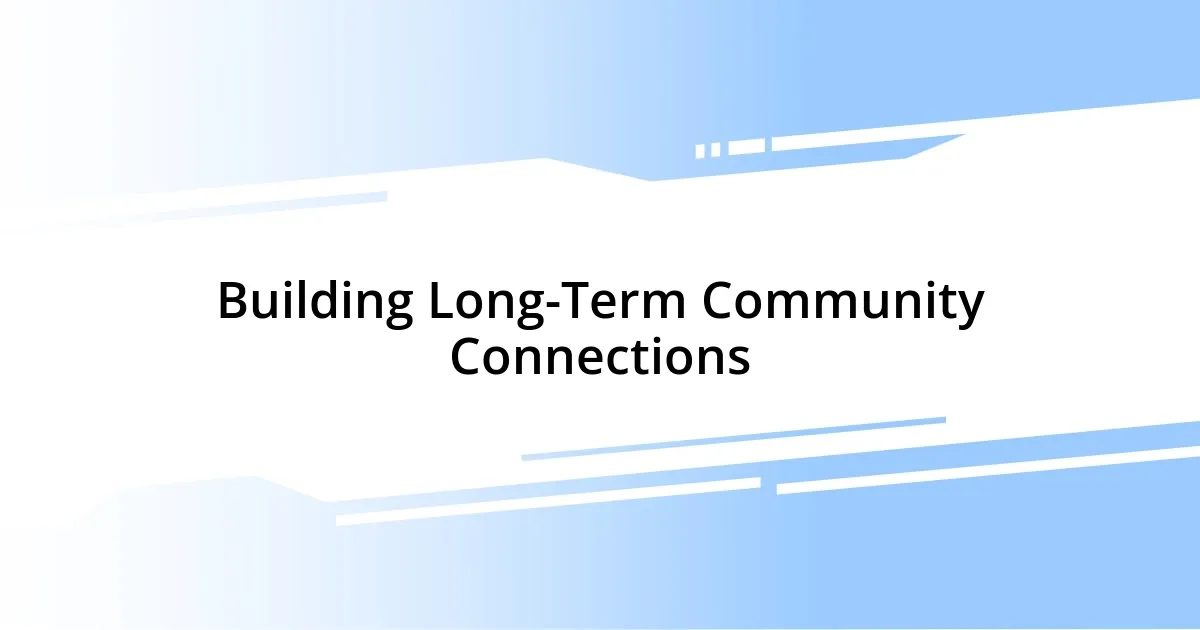
Building Long-Term Community Connections
Building long-term connections within the community has been one of the most rewarding aspects of my volunteer journey. I remember my first day at a local community garden, where I was a bit nervous and unsure of my place. But after just a few hours of planting and chatting with seasoned volunteers, I felt a sense of belonging. It was clear that every person there shared a commitment not just to the plants, but to each other. Have you ever felt that instant camaraderie that makes you realize you’re part of something bigger?
As I continued my involvement, I noticed how these connections deepen over time. During one particular event, we hosted a harvest festival, and I was amazed to see community members I had only met through volunteering come together to celebrate. The laughter, shared stories, and teamwork created bonds that extended way beyond the garden itself. It struck me that these relationships weren’t just about helping a cause; they were about creating a tapestry of support within the neighborhood. How often do we find such incredible connections in our daily lives?
What really stands out to me is how these relationships have fostered an environment of mutual support. After a community cleanup day, I was invited to join a local committee focused on environmental issues. That opportunity arose simply because I took the time to connect with fellow volunteers. It reinforced my belief that when we invest in relationships through volunteering, we not only contribute to causes but also create a network of friends and allies. Isn’t it powerful to think that by just showing up, we can open doors to new experiences and friendships?

